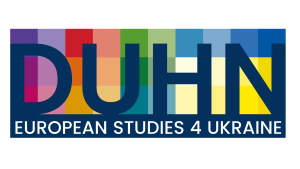
DUHN – European Studies 4 Ukraine
Das Logo des DUHN - European Studies 4 Ukraine Projektes.
Graphic: Sabine MüllerThe Friedrich Schiller University Jena is part of the “German-Ukrainian University NetworkExternal link” (DUHN), which is being established with the support of the German Academic Exchange Service (DAAD). The aim of this initiative is to support Ukrainian universities in their reconstruction efforts and to enable the integration of the Ukrainian higher education sector into the European Higher Education Area. A total of 29 German universities are receiving funding, and their cooperation partners include 47 Ukrainian universities. The DAAD funding program is planned to run for four years and will end on June 30, 2029. The University of Jena will receive €790,000 in funding for this period.
The International Office of Friedrich Schiller University Jena centrally coordinates the project. Within DUHN, the University of Jena cooperates with its long-standing Ukrainian partner universities:
Project description
The project is comprised of two modules:
- Module 1 – Interdisciplinary Study Program:
The existing cooperation with the three Ukrainian partner universities will be consolidated and developed into an interdisciplinary study program, “European Studies”, featuring both in-person and virtual teaching modules. On the Jena side, six academic disciplines are involved: Political Science de, Economics de, Philosophy de, Slavic Studies de, Eastern European History de, and German as a Foreign and Second Language de.Joint summer schools, guest lectureships, and study visits will place special emphasis on the exchange and mobility of students, doctoral candidates, and faculty members from the partner institutions. The initiative promotes sustainable cooperation as well as the development of both academic and interdisciplinary skills. The thematic focus areas include political systems and their economic functions, cultural practices, and European languages. Through digital teaching, mirror seminars, and co-teaching formats, courses can be flexibly designed to accommodate the current situation and actively involve Ukrainian lecturers. - Module 2 – University Administration and Internationalization:
This module offers professional development opportunities, for example in quality assurance for international study programs, research management, intercultural competence development, and the application of artificial intelligence in internationalization processes. Both Ukrainian and German university staff members will benefit equally from these offerings. Designed for administrative staff from all Ukrainian universities, the program will promote international competencies and build sustainable networks through in-person, hybrid, and digital training formats. This collaboration is expected to lead to joint events, new third-party funded projects, and the long-term use of digital learning resources.
Project coordination and contact (Germany)
-
International Office
Project Lead
Dr. Claudia Hillinger, Head of the International Office and Career Point
- E-Mail: duhn_jena@uni-jena.de
- Phone: +49 3641 9-401500
Team Assistant
Ilia Uchitel
- E-Mail: ilia.uchitel@uni-jena.de
- Phone: +49 3641 9-401570
Student assistants
Franziska Lorenz
- E-Mail: franziska.lorenz@uni-jena.de
Jason Domzalski
- E-Mail: jason.domzalski@uni-jena.de
-
Political Science
apl. Prof. Dr. Olaf Leiße
- E-Mail: olaf.leisse@uni-jena.de
Coordination
Lena Frisch, project coordination for dual degree program with NAUKMA University
- E-Mail: lena.frisch@uni-jena.de
-
Economics
Prof. Dr. Armin Scholl
- E-Mail: armin.scholl@uni-jena.de
Coordination
Dorota Antkowiak, Departmental International Office
- E-Mail: dorota.antkowiak@uni-jena.de
-
Philosophy
Prof. Dr. Andreas Schmidt
- E-Mail: andreas.as.schmidt@uni-jena.de
-
Slawistics
Prof. Dr. Ruprecht von Waldenfels,
- E-Mail: ruprecht.waldenfels@uni-jena.de
-
Eastern European History
Prof. Dr. Joachim von Puttkamer
- E-Mail: joachim.puttkamer@uni-jena.de
Coordination
Daniela Gruber, management of Imre Kertész Kolleg Jena
- E-Mail: daniela.gruber@uni-jena.de
-
German as Second and Foreign Language
Dr. Bernd Helmbold, management / study programme director "Teaching German"
- E-Mail: bernd.helmbold@uni-jena.de
Coordination
Dorothea Spaniel-Weise, Dr., Erasmus coordination
Latest news
Here you can gain insights into the DUHN project.
Project coordination and contact (Ukraine)
-
Kyiv National University - Mohyla Academy
Larysa Chovnyuk, head of international office
- E-Mail: larch@ukma.edu.ua
-
Ivan Franko National University of Lviv
Oksana Molderf, economics and international office
- E-Mail: oksana.molderf@lnu.edu.ua
Oksana Krayevska, International office
- E-Mail: oksana.krayevska@lnu.edu.ua
-
Ukrainian Catholic University in Lviv
Solomiia Rozlutska, International office
- E-Mail: rozlutska@ucu.edu.ua





